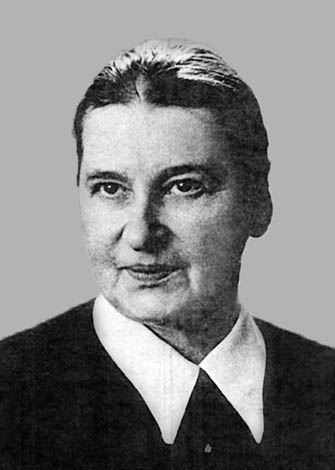Zhurba, Halyna
Zhurba, Halyna [Журба, Галина; Žurba; pseudonym of Halina Dombrowska], b 29 December 1888 in Teplyk, Haisyn county, Podilia gubernia, d 9 April 1979 in Philadelphia, USA. Writer. The daughter of a Polish noble and a Polonized mother, she was Ukrainianized by the rural environment of her childhood. In 1909 her first, critically acclaimed story collection, Z zhyttia (From Life), was published in Odesa. She contributed several stories to the journal Ukraïns’ka khata; a 1912 issue of the journal was confiscated by the tsarist censors because of her story ‘Koniak’ (The Horse). From 1912 she lived in Kyiv and was part of the Ukraïns’ka khata circle. From 1917 to 1919 she was an editor of the daily Nova rada (Kyiv). In 1919 she belonged to the writers’ group Muzahet and published her second story collection, Pokhid zhyttia (The March of Life). Having fled from Soviet rule in 1920 to the Polish internment camp in Tarnów, in the interwar years she lived with her husband, Antin Nyvynsky, in Zdolbuniv, Volhynia, in Lviv, and in Warsaw. She published the plays Malanka (1921) in Tarnów and Metelytsia (The Blizzard) and V pereleti vikiv (As Years Fly By) in Prague, in Mykyta Shapoval’s journal Nova Ukraïna (Prague). She also published a story in the Soviet journal Vsesvit (1925, no. 20). Her major works, two award-winning novels about the Revolution of 1917 in Volhynia, Zori svit zapovidaiut' (Stars Forecast the World, 1933) and Revoliutsiia ide (The Revolution Is Coming, 2 vols 1937–8), were published in Lviv. In 1943 her ‘sensational’ novel Doktor Kachioni (Doctor Caccioni) was published in Cracow. As a postwar displaced person Zhurba lived in Germany. After emigrating to the United States of America in 1950, she published an autobiographical account of her childhood, Dalekyi svit (A Distant World, 1955), the first volume of a planned semiautobiographical trilogy, Todir Sokir (1967), and essays, short stories, and temperamental articles in émigré periodicals. She insisted on using an idiosyncratic phonetic orthography and many little-known, archaic words in her later works.
Roman Senkus
[This article originally appeared in the Encyclopedia of Ukraine, vol. 5 (1993).]
